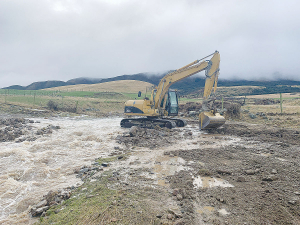M.I.A.
OPINION: The previous government spent too much during the Covid-19 pandemic, despite warnings from officials, according to a briefing released by the Treasury.
 Recent floods are a good reminder of how well we manage infrastructure assets in the regional sector, and the importance of this work to protect communities from the risks of flooding.
Recent floods are a good reminder of how well we manage infrastructure assets in the regional sector, and the importance of this work to protect communities from the risks of flooding.
OPINION: As I write, our nation has returned to lockdowns and it has given me time to reflect on all we have accomplished in the year since the Covid-19 pandemic hit this country hard.
Part of what we have accomplished here at Waikato Regional Council is due to the Government’s economic response to Covid-19 – the provision of funding to cushion the financial blow to whānau and families, workers, businesses and communities from the impacts of the lockdown – through what’s known as shovel ready projects.
This council received a total contribution of around $29 million in shovel-ready project funding for multiple environmental restoration, biosecurity and climate resilience infrastructural multi-year projects totalling about $48 million across the Waikato region to help reset and rebuild the economy.
In the past year, thanks to that funding, we have been able to award 31 contracts to local businesses and see the equivalent of 34 people gainfully employed.
In the environmental restoration space, 25 hectares of land has been retired, 47.5 kilometres of fencing has been done, 110,081 native plants and 26,695 willow and poplar plants for erosion control have gone in the ground, and 133 hectares of land has been controlled for pest plants. Of these projects, the Piako River Green Corridor alone will see 36km of riparian margin planted with a quarter of a million native plants over the next five years.
The benefits of these projects include a reduction of sediments and contaminants to our waterways. This will improve water quality and enhanced habitats for our native species.
Shovel ready funding has enabled us to start six flood protection projects in the Waikato – that will involve upgrading our stopbanks and pump houses, rationalising assets and replacing ageing pumps with new fish-friendly versions. The first of five fish-friendly pumps is due to be installed at Aka Aka, near Waiuku, and is quite an impressive looking piece of kit at 10 metres in length and 1.6 metres in diameter.
The July floods on the West Coast and in the Marlborough district are a good reminder of how well we manage our infrastructure assets in the regional sector, and the importance of this work to protect our communities from the risks of flooding.
The regional sector tour ahead of the Local Government New Zealand conference in the Marlborough district visited the Wairau River just five days before it flooded. It was hard to imagine at the time the enormous floodplain ever fully flowing. The stopbanks had been built after the 1983 floods and never been tested. That test came with the deluge that followed in July, with the stopbanks full to the brim and overtopping, but doing the job they were designed to do.
Three quarters of the Waikato benefits from flood protection, but the work that’s done is not always understood by our communities. Flood protection safeguards lives and property, enables productive use of land, and protects services such as water supply, power, telecommunications and roading networks. Our schemes are built to protect against a certain level of flooding, and no more.
When flood protection works well, it becomes invisible or taken for granted. But there’s always risk. Just as we have seen recently in other parts of New Zealand.
Russ Rimmington is chair of Waikato Regional Council. Views are his own.
Changed logos on shirts otherwise it will be business as usual when Fonterra’s consumer and related businesses are expected to change hands next month.
Reflecting on the past year, Horticulture New Zealand chief executive Kate Scott says there has been a lot to celebrate.
Ministry for Primary Industries (MPI) Director General Ray Smith is giving a big shout-out to the horticulture sector, especially kiwifruit.
Early forecasts for New Zealand's apples and pears point to a standout season marked by exceptional fruit quality and high pack-out rates.
Tickets are now available for Beef + Lamb New Zealand’s (B+LNZ) Out the Gate, returning from 19-21 May 2026 at Te Pae, Christchurch.
Dairy Women's Network (DWN) is welcoming AgriHealth as a new partner.
OPINION: Fonterra may be on the verge of selling its consumer business in New Zealand, but the co-operative is not…
OPINION: What does the birth rate in China have to do with stock trading? Just ask a2 Milk Company.